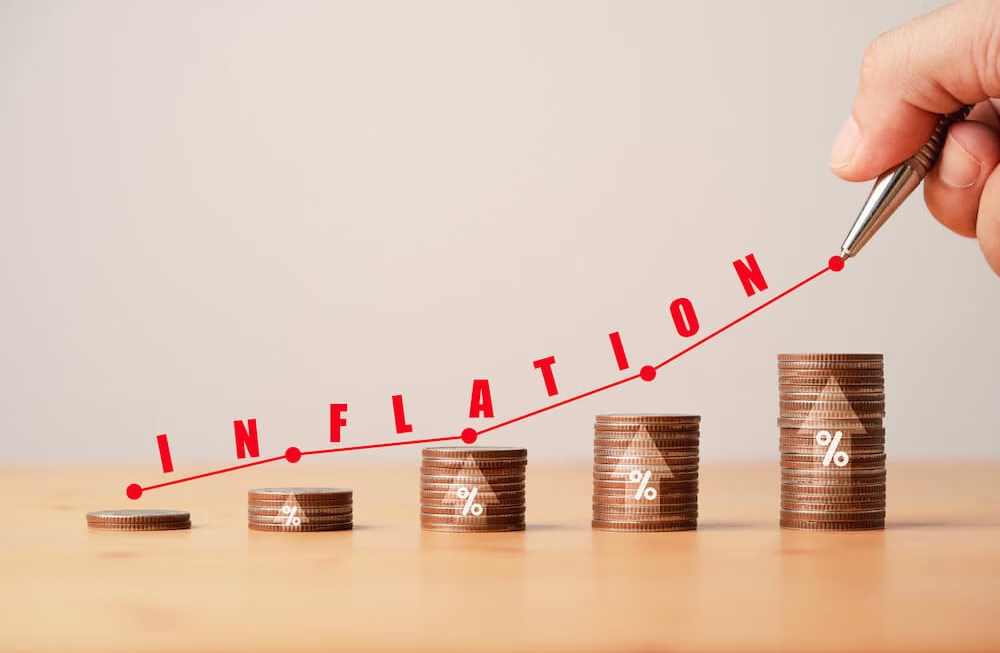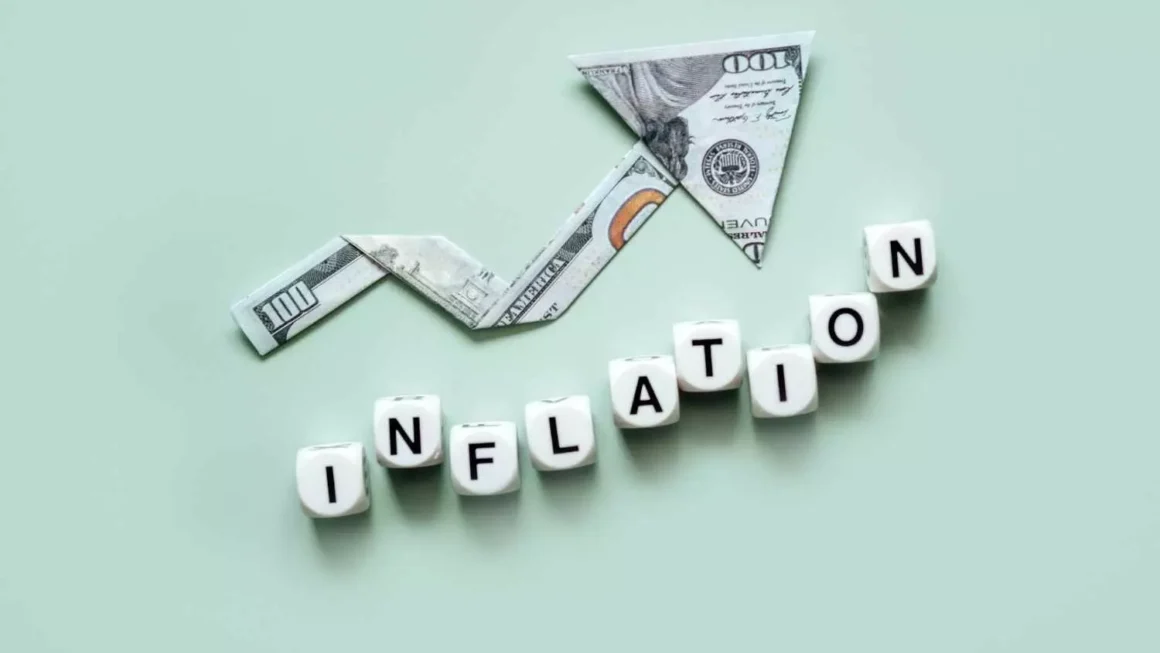Inflation is a key economic indicator that affects nearly every aspect of our financial lives. At its core, inflation is the rate at which the prices of goods and services rise over time, leading to a decrease in the purchasing power of money. While inflation is a natural part of a growing economy, its impact on personal finances can be significant, especially when it outpaces wage growth.
For individuals and households, understanding the effects of inflation is crucial for managing finances effectively. Inflation can impact everything from daily expenses and savings to investments and debt. The rising costs of everyday items, such as groceries, gas, and housing, can squeeze your budget, while the value of your savings may erode if they don’t keep pace with inflation.
In this article, we will explore how inflation influences various aspects of personal finances, including budgeting, savings, debt, and investments. Additionally, we will look at strategies to protect and manage your finances in an inflationary environment, ensuring that your purchasing power and financial security remain intact.
1. The Impact of Inflation on Everyday Expenses (Approx. 600 words
One of the most immediate effects of inflation is the increase in the cost of everyday goods and services. As prices rise, consumers find that they are spending more money to buy the same items. Some of the most affected areas include:
- Groceries: The price of food, especially staples like bread, meat, and dairy, tends to rise during periods of inflation. Over time, this can lead to a noticeable increase in your grocery bills, affecting your household budget.
- Gasoline and Transportation: Fuel prices are particularly sensitive to inflation and can rise rapidly during inflationary periods. This not only affects the cost of filling up your car but also impacts transportation costs for goods, increasing the prices of products you buy in stores.
- Housing and Rent: As inflation increases, the cost of construction materials and labor rises, which often translates into higher housing prices and rent. Homebuyers may find it harder to afford homes, and renters may face higher rents when leases are renewed.
- Healthcare: Inflation can also affect the cost of healthcare services, including insurance premiums, prescription drugs, and out-of-pocket expenses. As the cost of medical care increases, individuals and families may need to allocate more of their budget to healthcare.
To manage these rising costs, it’s important to regularly review and adjust your budget. Identifying areas where you can cut back or make adjustments—such as switching to more affordable grocery brands, using public transportation, or refinancing a mortgage—can help alleviate some of the financial pressure caused by inflation.
2. Savings Erosion and Inflation (Approx. 600 words)
One of the most subtle yet impactful consequences of inflation is its ability to erode the value of your savings. When inflation rises, the purchasing power of the money you have saved decreases, meaning that the same amount of money will buy fewer goods and services in the future.
For example, if you have $10,000 in a savings account with an interest rate of 1%, but inflation is running at 3%, you’re effectively losing purchasing power on your savings, even though the dollar amount remains the same. In this scenario, your $10,000 will have less buying power after a year, despite earning interest.
Here are some ways inflation impacts savings:
- Low Interest Rates: In times of low interest rates, your savings accounts and certificates of deposit (CDs) may not yield enough interest to outpace inflation. As a result, your savings might actually lose value in real terms, even though they grow nominally.
- Reduced Purchasing Power: Over time, inflation can gradually reduce the value of long-term savings, making it harder to achieve financial goals like buying a home or funding a child’s education.
Inflation-Protected Savings Options: To mitigate the impact of inflation on savings, individuals can consider options like Treasury Inflation-Protected Securities (TIPS), which are government bonds designed to keep pace with inflation, or investing in assets like stocks and real estate, which historically have outperformed inflation over the long term.
3. Inflation and Debt: How Your Loans Are Affected (Approx. 600 words)
Inflation can have a mixed impact on your debt. The effect depends on whether your debts are fixed or variable.
- Fixed-Rate Debt: If you have fixed-rate loans, such as a mortgage or auto loan, inflation can actually work in your favor. Since the interest rate is locked in, your monthly payments remain the same, but the value of the money you owe decreases over time. This means that in an inflationary environment, you’re effectively paying off your debt with “cheaper” dollars. For example, if you owe $200,000 on your mortgage, and inflation reduces the purchasing power of the dollar, your mortgage payments will remain constant, but in real terms, you are paying back less value. This can be a positive for borrowers with fixed-rate debt.
- Variable-Rate Debt: On the other hand, inflation can lead to higher interest rates, which increases the cost of variable-rate debt like credit card balances, home equity lines of credit (HELOCs), or adjustable-rate mortgages (ARMs). As inflation rises, central banks often raise interest rates to control inflation, which leads to higher borrowing costs for consumers.
For those with variable-rate debt, inflation may increase monthly payments and make it harder to pay down the principal. In this case, focusing on paying off high-interest debt quickly and refinancing to fixed-rate options (if possible) can help mitigate the negative impact of inflation.
4. Inflation and Investments: Protecting Your Portfolio (Approx. 600 words)
Inflation can also affect your investments in several ways. While some assets may benefit from inflation, others may see their value diminish.
- Stock Market: Stocks have historically been one of the best ways to hedge against inflation. Companies that can raise prices during inflationary periods often see their profits grow, which can drive stock prices higher. However, inflation can also lead to higher interest rates, which may negatively affect some sectors, particularly those reliant on borrowing, such as real estate and utilities.
- Real Estate: Real estate is often seen as a good hedge against inflation. As the cost of building materials and labor rises, property values and rents tend to increase, making real estate a valuable asset during inflationary periods. Rental income can also rise as inflation drives up rent prices, providing a consistent cash flow.
- Precious Metals: Gold and other precious metals are traditional hedges against inflation, as their value tends to rise when the purchasing power of fiat currencies falls. Investing in commodities or precious metals can help protect your wealth during periods of high inflation.
- Bonds: While traditional bonds can be adversely affected by inflation (since rising inflation often leads to higher interest rates, which lowers the value of existing bonds), inflation-protected bonds like TIPS can help protect against inflation risk.
To protect your investments from inflation, it’s essential to maintain a diversified portfolio that includes inflation-resistant assets, such as stocks, real estate, and commodities, alongside more traditional assets like bonds.
5. Managing Your Personal Finances in an Inflationary Environment (Approx. 600 words)
While inflation can pose challenges to your personal finances, there are several strategies you can implement to manage its effects and even benefit from it:
- Adjust Your Budget: In an inflationary environment, it’s crucial to regularly update your budget to account for rising prices. Track your spending closely and find areas where you can cut back or adjust. For example, consider switching to more cost-effective brands or reducing discretionary spending on non-essential items.
- Invest in Inflation-Protected Assets: As mentioned earlier, investing in assets that historically perform well during inflation, such as stocks, real estate, and precious metals, can help preserve and grow your wealth. Additionally, consider allocating a portion of your savings to inflation-protected securities like TIPS.
- Refinance Debt: If you have high-interest, variable-rate debt, consider refinancing to a fixed-rate loan to lock in lower interest payments. With inflation driving interest rates higher, locking in a fixed rate now can help protect you from rising borrowing costs in the future.
- Increase Your Income: To keep pace with rising costs, consider ways to increase your income. This could include negotiating a salary raise, starting a side hustle, or investing in upskilling to qualify for higher-paying roles.
- Build an Emergency Fund: Inflation can cause financial uncertainty, making it essential to have an emergency fund that can cover at least 3–6 months of living expenses. This fund acts as a buffer in case inflation causes unexpected financial strain.
Conclusion (Approx. 300 words)
Inflation is a powerful economic force that impacts nearly every aspect of personal finances. From rising costs of goods and services to eroding the value of savings and increasing debt burdens, inflation poses challenges for individuals and families. However, by understanding how inflation affects your personal finances, you can take steps to protect and manage your money.
By adjusting your budget, investing in inflation-protected assets, refinancing debt, and increasing your income, you can mitigate the negative effects of inflation and even use it to your advantage. Staying informed about inflation trends and being proactive in managing your finances can help ensure that you maintain financial stability, even in inflationary times.





Autocad crack
Autocad 2025
autodesk autocad crack
auto cad crack
fl studio crack
fl studio 2025
idm crack
idm 2025
Internet Download Manager crack
revit crack
autodesk revit 2025
autodesk revit crack
photoshop crack
photoshop crack
adobe photoshop crack
acrobat crack
adobe acrobat crack
premiere pro crack
adobe premiere pro crack
filmora crack
filmora crack 2025
Lightroom crack
adobe Lightroom crack
adobe after effects crack
after effects crack
illustrator crack
adobe illustrator crack
disk drill crack
JetBrains crack
JetBrains PyCharm crack
Wallpaper Engine crack
Wallpaper Engine free 2025
valorant hack 2025
valorant aimbot
valorant cheat
capcut crack
capcut pro crack
lightroom crack
adobe photoshop crack
acrobat crack
adobe acrobat crack
premiere pro crack
adobe premiere pro crack
filmora crack
filmora crack 2025
Lightroom crack
adobe Lightroom free download
disk drill crack
JetBrains crack
JetBrains PyCharm crack